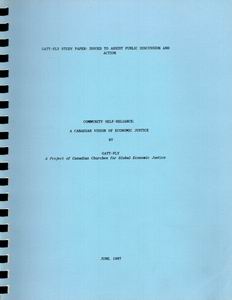
Community Self-Reliance
A Canadian Vision of Economic Justice
Date Written: 1987-06-01
Publisher: GATT-Fly, Toronto, Canada
Year Published: 1987
Pages: 76pp Resource Type: Pamphlet
Cx Number: CX3289
GATT-fly believes that "the root cause of poverty and unemployment is the undemocratic nature of our economies", which, in Canada as in the Third World, means control over the economy by transnational corporations and a powerful few at home. There is a copy of this publication in the Connexions Archive.
Abstract:
GATT-fly believes that "the root cause of poverty and unemployment is the undemocratic nature of our economies", which, in Canada as in the Third World, means control over the economy by transnational corporations and a powerful few at home. It argues for a strategy of economic self-reliance, whose basic elements would be that Canadians produce the essential goods and services they need; that those of now receive average or below average incomes (the vast majority) receive enough income to purchase the goods and services they need; and that foreign trade would be a planned extension of production and trade at home. Bringing about such self-reliance is seen as a political problem which requires popular education and action initiatives. Chapters examine what an approach of self-reliance would mean in the area of employment and incomes policy, what it would mean for Canadian industry, how foreign indebtedness could be handled, what impact it would have on ownership patterns and international relations, what it would mean for technological innovation.
-
Table of Contents
1 - Self-Reliance, Justice, and Independence: New Beginnings
Character of the Study
Self-Reliance
Links in a Chain
The Other Alternative: International Dependence
The Consequences of International Dependence
Transnational Corporate Power
Other Dimensions of Self-Reliance
The Politics of Self-Reliance: An Introduction
The Fight for Self-Reliance
Self-Reliance, Ownership and Control
The First Steps
2 - The Location of Self-Reliance
Basic Principles
Nations
The Location of Canadian Self-Reliance
Regional Underdevelopment
Local Communities
The Question of Scale Economies
A History of Self-Reliant Experiments
3 - The Politics of Self-Reliance
Democracy & Self-Reliance
Education
Making the Costs Clearer
A Further Note About Costs
Evolution and Revolution
Extra-Parliamentary Coalitions
The Need for Speed, and Patience
4 - Employment, Incomes, and Human Services
Self-Reliance and Full Employment
Incomes Policy
A Guaranteed Above-Poverty Income
Income Redistribution
Human Services
5 - Self-Reliant Industrial Strategy
Basic Industries
Industrial Underdevelopment
Growing Trade Dependence
Controlling External Trade
Eliminating Poverty
Impact on Output & Employment
Summary
6 - Dealing with Foreign Indebtedness
Debt and Dependence
Kicking the Habit
A Multilateral Approach to Global Debt
Repaying the Debt
Finding the Money
Domestic Consequences
7 - Investment, Financial Institutions, and Savings
The Investment Challenge
Canada's Surplus Holders
Redirecting the Surplus: a) Loans Abroad, b) Changing the Pattern of Domestic Investment
Using Present Production Capacity
Ownership and Control of Investment
The Quantity of Investable Surplus
8 - Patterns of Ownership and Control
Foreign Ownership in Canada
Canadian Ownership Abroad
Collective, State or Private Ownership?
Economic Planning
Reconciling Differences
9 - International Relations
Changing Trade Patterns
Travel
Immigration
International Aid - The Present Context
Self-Reliant International Aid
10 - Self-Reliance and Technological Innovation
Input/Output Ratios
Technological Change and Input/Output Ratios
Technology and Jobs
Technology and Capital Costs
Future Prospects
Self-Reliant Technologies
a) Capital Utilization
b) Reducing the Full-Time Work Week
c) New Technologies and New Products
Glossary
Further Readings


